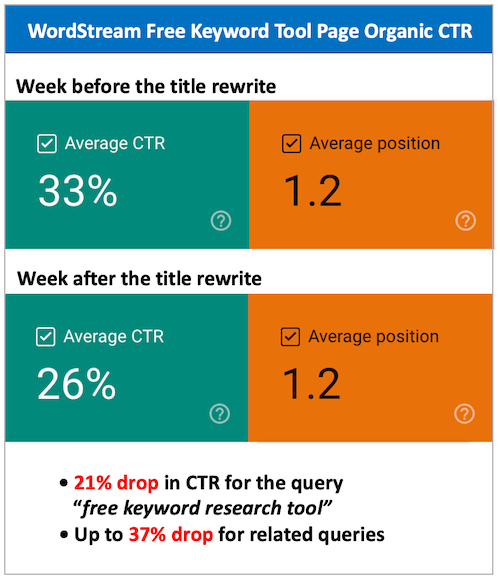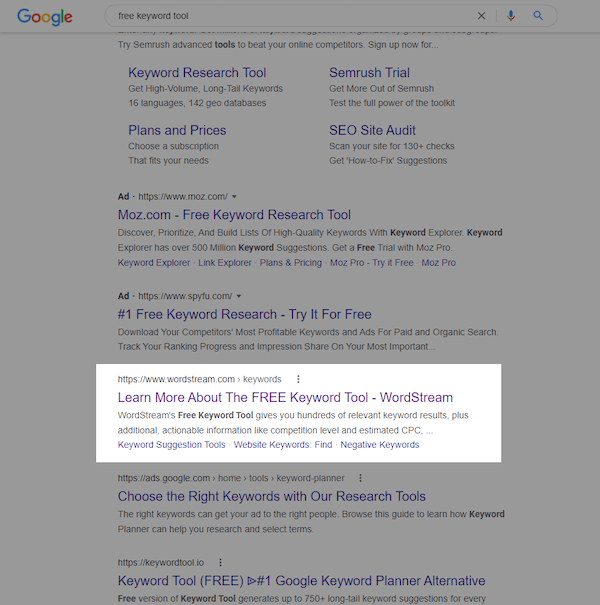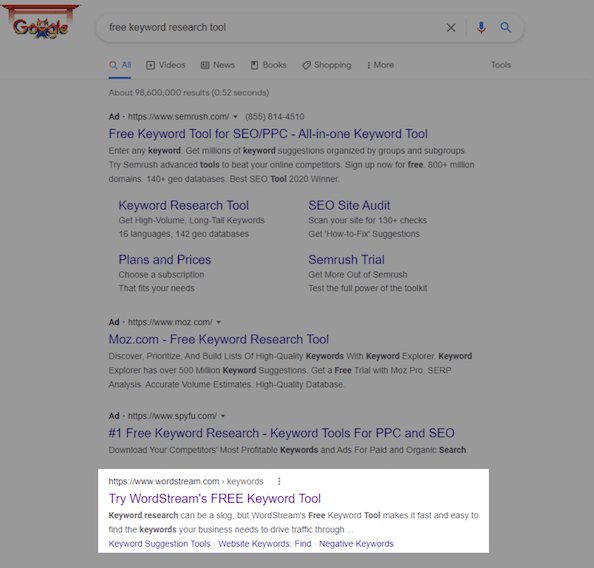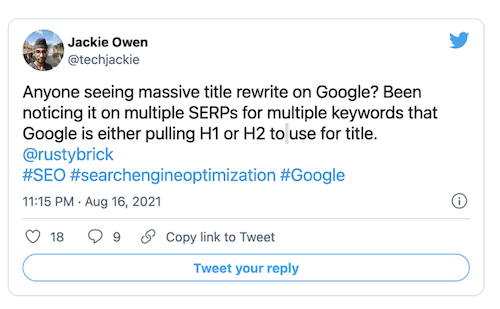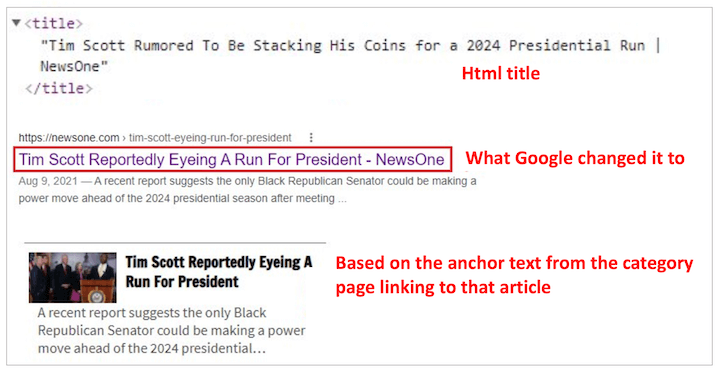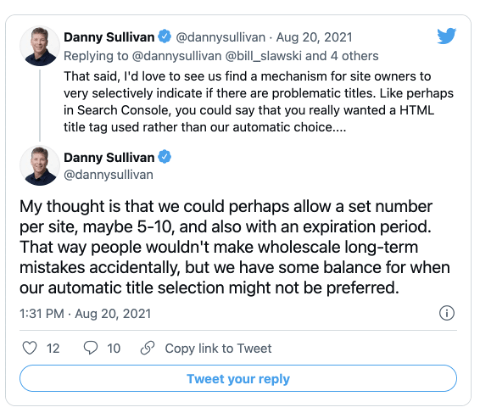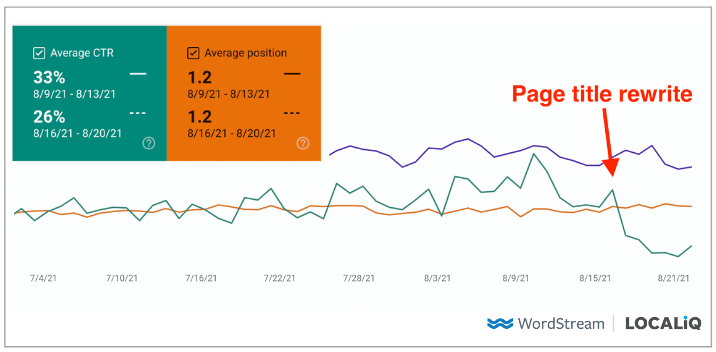
We’ve known for a while now that Google will sometimes change a page’s title in the SERP based on the query. But on Monday, August 16, many SEOs began noticing their titles being completely rewritten, in a detrimental way.
We, too, noticed this, as one of our top trafficked pages took a big hit from the change.
Needless to say, we were a little taken aback. So what’s going on here? We investigated and are sharing with you:
- A clear case study of a title tag rewrite that significantly hurt our traffic.
- How it happened and what we did to fix it.
- How this story has been unfolding in the SEO community.
- Google’s comments on the change and what it means for all of us.
Special thanks to Elisa Gabbert and Gordon Donnelly for collaborating on this piece.
How Google’s title rewrite dropped our CTR
On Monday, we noticed that traffic to one of our long-standing top pages (our Free Keyword Tool) for the week of August 16-22 was down 25% compared to the previous week, with a noticeable drop-off between August 16 and 17.
When we started digging into this issue in our Search Console account, we saw that average position for the page in Google was steady, and impressions had actually increased, but the page’s organic click-through rate (CTR) had fallen sharply, from 33% to 26% for the top traffic-driving query—a 21% drop.
We saw a 21% drop in CTR for the top query to our Free Keyword Tool page, with no change in position.
This significant drop was for the query “free keyword research tool,” the single query that drives the most traffic to the page (and one of the top queries for our site overall). We saw similar drops across a range of related keyword searches. For example, for the query “free keyword tool” the CTR fell by 37%.
It was then that Elisa Gabbert, our Director of Content and SEO, did a little further digging and noticed that Google had changed the title displaying on the SERP, from “Free Keyword Tool” to “Learn More About The FREE Keyword Tool.” This was not the title we had given the page—it was an H1 tag from a section pretty far down on the page.
This change made the page look like an informational page rather than an actual tool, making the apparent intent match worse. Obviously, people using a search query like “keyword research tool” or “free keyword tool” want to find a tool and use it, not “learn about” a tool. This would explain the drop in CTR despite the average position staying steady.
What we did to fix it
In an attempt to force Google to display the title we wanted them to use, we edited the heading on the page they were displaying on the SERP to “Try WordStream’s FREE Keyword Tool” and then requested recrawling through Search Console. This title is much more actionable and reflects a better intent match.
Our title is now the title showing in the SERP, and traffic to the page immediately recovered to previous levels.
Elisa, along with our Senior Manager of SEO Gordon Donnelly, had been hearing about these changes in the news. And sure enough, the story began picking up momentum.
How the Google page title update story unfolded
So it’s great that we were able to recover from our losses due to what is being referred to by some as the “page title update.” But as SEOs did their investigating, the issue appeared to be more complex. Here’s how the story unfolded.
SEOs see titles being replaced by header tags
On August 17, Barry Schwartz reported on Google displaying header tags instead of titles in the SERP—sharing examples of Tweets and wondering whether it was a bug or a test.
But it was more than <H1> header tags
The following day (August 18), Brodie Clark shared that Google isn’t replacing titles with only header tags, but provided evidence of titles being taken from “internal links, image alt text, or even made up completely by Google.”
He provided one extreme example by Lily Ray, where the title was replaced with the H1 from a completely different page that was linking to the article.
He also noted his observations that the rewritten titles seem to be shorter—not due to pixel limit but perhaps for readability purposes, and also to be able to include the brand name at the end of the snippet.
Danny Sullivan says this is not a new change
On August 23, Schwartz’s follow up article covered Danny Sullivan’s response to the feedback on Twitter. Here’s what Sullivan said.
He confirmed that Google has heard the feedback, but the change isn’t new.
“Suffice to say, we’ve heard the feedback & looking into all this. That said, it was never the case that writing the ‘perfect title’ guaranteed that title would be used. We have long used more than title tags for creating page titles. That’s not some new change…”
He reminded us that this isn’t necessarily a bad thing
Sullivan then pointed out that there are many cases where this “long-standing system of generating titles has helped pages with “terrible title tags.”
He talked about potential solutions for “problematic titles.”
Matt Southern refers to this as the “I really mean it” tag in SEJ’s coverage on Sullivan’s response.
Google confirms the update
Then finally, the following week on Tuesday, August 24, Google came forward about their web page title update, where it:
- Announced that it will no longer generate titles based on the query.
Instead, “our new system is producing titles that work better for documents overall, to describe what they are about, regardless of the particular query. It also mentioned placing particular importance on what a visitor can visually see on the page. - Reinforced that this is not entirely new
Google has been using more than the HTML title tag to generate titles since 2012—since some pages have tags that are very long, keyword-stuffed, or no tags at all. - Reassured us that creating good HTML tags is still important.
Google stated that the HTM title is “still by far the most likely used, more than 80% of the time.” And that they will soon be updating their help page on the topic to reflect the change.
Where does this land us?
As with any algorithm update, it’s generally not a good idea to go into your pages and optimize for that particular update, but instead to make sure you’re focusing on quality across the board. But it will be important to pay special attention to your traffic and CTR to see if there are any fixes or optimizations you need to make. As we’ve seen, Google doesn’t always get it right when they try to “improve” on your work!
How about you? Has Google rewritten any of your titles? Share your stories in the comments below!

